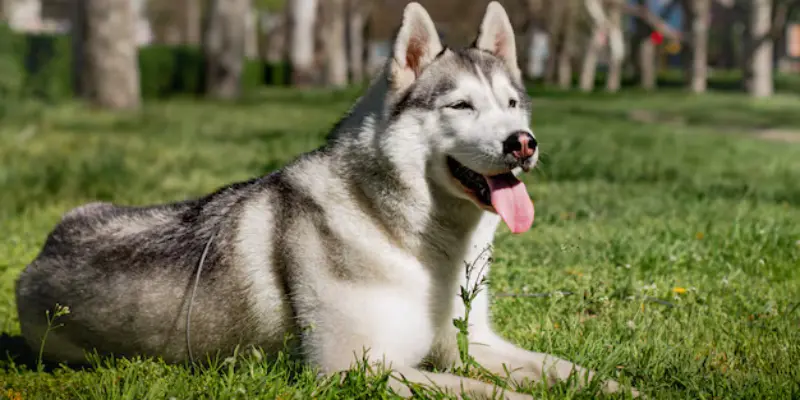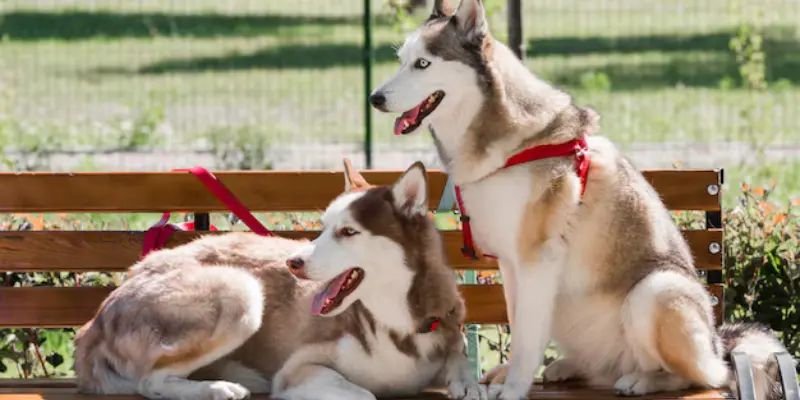The Intelligent and Loyal Husky and German Shepherd Breed
Updated: August 25, 2024
45
The Husky and German Shepherd Breed are the most popular and recognizable dog breeds. The German Shepherd, originating from Germany, is celebrated for its intelligence, loyalty, and versatility. It’s a breed often seen in roles like police work, search and rescue, and as a service dog due to its keen mind and strong work ethic.
With its roots in Siberia, the Siberian Husky was originally bred to pull sleds over long distances in harsh climates. Huskies are known for striking looks, featuring a thick double coat and often blue or multi-colored eyes. They are friendly energetic, and have a strong independent streak, making them a favorite among active dog owners.
Characteristics of the Husky And German Shepherd Breeds
German Shepherd and Husky Breed Physical Traits
German Shepherds are large, strong dogs with a commanding presence. They have a dense coat that is typically black and tan, sable or all-black, and a confident, alert expression. Their muscular build and erect ears give them a noble and powerful appearance.

Huskies are medium-sized with a more agile build. Their thick double coat can come in various colors like black, white, gray, and red. Known for their wolf-like appearance, Huskies often have striking blue or mixed-colored eyes, which, along with their erect ears and bushy tails, contribute to their charismatic look.
Temperament Comparison: German Shepherds vs Huskies
| Trait | German Shepherds | Huskies |
|---|---|---|
| Loyalty | Highly loyal | Friendly and outgoing |
| Intelligence | Highly intelligent | Intelligent, but can be stubborn |
| Protective Nature | Natural protectors, excellent guard dogs | Less protective, more enthusiastic greeters |
| Trainability | Highly trainable | Challenging to train due to independence |
| Family Bonds | Form strong bonds with families | Thrive in social settings, enjoy company of other dogs |
| Discipline | Excel in roles requiring discipline | More playful and energetic, less disciplined |
| Guarding Instinct | Strong guarding instinct | Weak guarding instinct |
German Shepherds and Husky Breed Exercise and Grooming Requirements
Husky And German Shepherd Breeds Both breeds are high-energy dogs requiring much exercise. German Shepherds benefit from structured activities like obedience training, agility courses, and long walks. They need both physical and mental stimulation to prevent boredom.
Huskies, bred for endurance, need plenty of exercise, particularly running or vigorous play. They are known escape artists, so a secure yard is a must. Both breeds also require regular grooming, especially during shedding season. German Shepherds may need more frequent brushing due to their dense undercoat, while Huskies shed heavily twice a year, requiring more intensive grooming.
Husky German Shepherds Breed Health Considerations
Like all breeds, the Husky and German Shepherd mix can be prone to specific health issues. Common concerns include:
- Hip dysplasia.
- A condition is prevalent in both parent breeds.
- Eye conditions like cataracts or progressive retinal atrophy.
Regular vet check-ups and maintaining a healthy diet and exercise routine can help mitigate some of these risks.
The Gerberian Shepsky: A Blend of Both Breeds
Common Traits of the Husky-German Shepherd Mix
The Gerberian Shepsky often inherits a blend of characteristics from both parent breeds. Physically, they usually have a strong, muscular build with the sharp eyes and distinct facial markings of the Husky. Their coat is typically thick, with colors and patterns varying widely, requiring regular grooming to manage shedding.
In terms of temperament, Gerberian Shepskies are typically intelligent, loyal, and full of energy. They often combine the protective nature of the German Shepherd with the friendly and playful demeanor of the Husky. This mix creates a dog that can be a loving family companion and a vigilant watchdog. However, they require a lot of exercise and mental stimulation to stay happy and healthy.
Pros and Cons of Owning a Gerberian Shepsky
Owning a Gerberian Shepsky comes with its own set of rewards and challenges. Additionally, these dogs are likely to be intelligent, loyal, and affectionate. They can make excellent family pets, especially for active households that meet their high exercise needs. Their unique blend of traits often makes them versatile companions.

However, they can also present challenges. Their high energy levels and strong-willed nature can make training difficult for first-time dog owners. Without enough exercise and mental stimulation, they may become bored and destructive. Additionally, their grooming needs, especially during shedding seasons, can be demanding. Potential owners should be prepared for the time and effort required to care for this breed properly.
Crossbreeding the Husky and German Shepherd
Comparing Mixed Breeds and Crossbreeds
| Characteristic | Mixed Breed (Mutt) | Crossbreed |
|---|---|---|
| Ancestry | Uncertain, multiple breeds | Known, two purebred parents |
| Parentage | Unpredictable mix | Intentional mating of two purebreds |
| Breeding Purpose | Unplanned, natural breeding | Planned, to combine specific traits |
| Example | Unknown breed mix | Gerberian Shepsky (German Shepherd + Husky) |
| Trait Prediction | Less predictable | More predictable, based on parent breeds |
| Breeding Control | None | Controlled, by selecting parent breeds |
| Offspring | Variable characteristics | Combines desirable traits from both breeds |
The Debate Around Crossbreeding
Crossbreeding, particularly with popular breeds like the Husky And German Shepherd Breeds, is a topic of ongoing debate. Supporters argue that crossbreeding can produce healthier dogs by increasing genetic diversity and combining the best traits of both parent breeds. They also note that crossbreeds can avoid some health problems in purebred dogs due to inbreeding.
Critics worry that crossbreeding can lead to unpredictable results, with puppies sometimes inheriting undesirable traits from either parent breed. There is also concern about the ethics of breeding dogs for specific characteristics, particularly regarding the health and well-being of the animals. Some argue that crossbreeding can contribute to the overpopulation of dogs and that people should focus on adopting rather than breeding more dogs.
Breeding Huskies and German Shepherds
German Shepherd Breeding Process
Yes, Huskies and German Shepherds can be bred together, and the process is similar to that of any other dog breeds. It typically involves selecting a healthy male and female from each breed. The female will go through a heat cycle, during which she is fertile and can conceive. Breeding can occur naturally or through artificial insemination, resulting in a litter of mixed-breed puppies.
When breeding a German Shepherd and a Husky, the resulting puppies will inherit traits from both parents, leading to various appearances, sizes, and temperaments within the same litter.
Considerations for Breeding These Breeds
Breeding a German Shepherd and a Husky requires careful thought and planning. Both breeds have strong personalities, and their combination can result in an intelligent, independent, potentially stubborn dog. Breeders should know both breeds and understand the potential challenges of mixing them.
Health is another critical factor. Husky And German Shepherd breeders are prone to specific genetic health issues, such as hip dysplasia and eye conditions in Huskies. Responsible breeders should screen for these conditions and avoid breeding dogs that carry these genetic risks.
Can You Breed a Husky and a German Shepherd?
Legal and Ethical Considerations
Breeding a Husky and German Shepherd Breed is generally legal in most places, provided the breeder follows local regulations regarding animal welfare. However, ethical considerations are just as important. Breeders should consider the demand for mixed-breed puppies and avoid contributing to the overpopulation of dogs. Ethical breeding practices include ensuring that both parent dogs are healthy and have good temperaments and that the puppies are raised humanely.
Responsible Breeding Practices
Responsible breeding goes beyond just pairing two dogs. It involves prioritizing the health and well-being of both the parent and puppies. The puppies’ overall health and development rely on regular veterinary care, a nutritious diet, and adequate socialization. Responsible breeders should also be transparent with potential buyers, providing information about the parents’ health histories, the expected traits of the puppies, and any special care requirements.
Prospective owners should also be carefully screened to ensure they are prepared to own a Gerberian Shepsky, including understanding this active and intelligent crossbreed’s exercise, grooming, and training needs.
Can Huskies and German Shepherds Have Puppies Together?
Yes, Huskies and German Shepherds can breed and have puppies together! This mix is often called a Gerberian Shepsky. But before we dive into the details, let’s consider a few things.
Biological Compatibility
Huskies and German Shepherds are both dogs, which means they can technically breed. They share a similar genetic makeup, making them able to produce offspring.
Breeding Challenges
Breeding Huskies and German Shepherds can be challenging due to their differences:
- Size: Huskies are generally smaller than German Shepherds
- Coat types: Huskies have a thick double coat, while German Shepherds have a medium-length coat
- Temperaments: Huskies are friendly and outgoing, while German Shepherds are loyal and protective
Responsible Breeding
If you’re considering breeding Huskies and German Shepherds, make sure to:
- Research reputable breeders or consult with a veterinarian
- Prioritize the health and well-being of both parents and puppies
- Ensure proper care and socialization for the puppies
Conclusion
The German Shepherd and Husky are two exceptional breeds with unique characteristics. When combined, they create a crossbreed, known as the Gerberian Shepsky, that can embody the best of both worlds. This mix can be a loyal, intelligent, and energetic companion, suitable for families and individuals ready to meet their high exercise and grooming demands.
Final Thoughts
The Gerberian Shepsky is a remarkable breed mix that offers the best of the German Shepherd and the Husky. Whether you’re drawn to their striking appearance, intelligence, or energetic nature, owning a Gerberian Shepsky can be a rewarding experience for those prepared to handle the responsibilities that come with it.
FAQs
What is a mix of a Husky and a German Shepherd called?
A mix of a Husky and a German Shepherd is commonly known as a Gerberian Shepsky.
Can Huskies and German Shepherds breed?
Yes, Huskies and German Shepherds can breed, but it’s essential to consider the potential health risks and challenges associated with crossbreeding.
What are the characteristics of a Husky-German Shepherd crossbreed?
Gerberian Shepskies often inherit the intelligence, loyalty, and energy levels of both parent breeds, making them active, loyal, and loving companions.
Are Husky-German Shepherd mix breeds healthy?
While generally healthy, Gerberian Shepskies can inherit health issues from their parent breeds, such as hip dysplasia, eye problems, and digestive issues.
How big do Husky-German Shepherd mix breeds get?
Gerberian Shepskies typically range from medium to large, weighing between 35-88 pounds and standing 20-26 inches tall.
Do Husky-German Shepherd mix breeds make good family pets?
Yes, with proper training and socialization, Gerberian Shepskies can make excellent family pets, especially for active families who can provide the necessary exercise and attention.
Can you breed a Husky and a German Shepherd?
Yes, but it’s crucial to prioritize responsible breeding practices, ensuring the health and well-being of both parent breeds and their offspring.
Please Write Your Comments